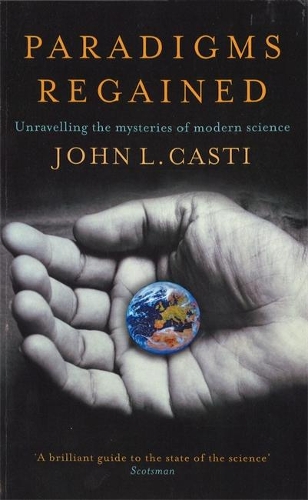
Paradigms Regained: Unravelling the Mysteries of Modern Science
(Paperback)
Publishing Details
Paradigms Regained: Unravelling the Mysteries of Modern Science
By (Author) John Casti
Little, Brown Book Group
Abacus
1st November 2001
United Kingdom
Classifications
General
Non Fiction
500
Physical Properties
Paperback
336
Width 127mm, Height 203mm, Spine 19mm
410g
Description
How did life on Earth get started Can we duplicate human thought in a computing machine How do children acquire language In "Paradigms Lost", John L. Casti looked at the state of play with these and a handful of other eternal questions, outlining the competing answers on offer and describing the scientists who advocated them. In this book, he recounts the huge leaps science has made since then, and how new theories and candidate answers have emerged for almost all the big questions. As we enter the 21st century, the book provides a summary of what we understand about key scientific issues.
Reviews
'A classic, cleverly updated to reconsider eternal questions in the light of current knowledge.' SUNDAY TIMES 'A brilliant guide to the state of science.' SCOTSMAN 'Casti writes in a well-practised and easy style.' TIMES HIGHER EDUCATIONAL SUPPLEMENT 'In Paradigms Regained, John Casti re-examines the six big questions he looked at in his 1989 book, Paradigms Lost: Did life begin naturally and on Earth Is human behaviour genetically determined Is there a language organ in the human brain Can computers think Can we talk to ET Is there a Real World In Paradigms Lost, he presents the evidence for yes and no answers to each question as though in a trial by jury, with witnesses arguing for the prosecution and defence, then a summary of the evidence and a verdict. Paradigms Regained takes the same questions to an appeals court, summarises the evidence from the "trial" and introduces new evidence from the intervening decade. Casti's goal is to show how science works, how "the single most characteristic feature of science is that its conclusions are tentative". So in three cases he now reaches a ruling of "appeal upheld", overturning his previous verdicts. In fact, the only one truly overturned is his conclusion of "not proven" to the question about the genetic determination of human behaviour: he thinks the evidence for "yes" has become much stronger. In the cases of the origin of life and the existence of a Real World, he has kept the same one-word answers but now favours different mechanisms. Together, the two books are good illustrations of how science looks at the questions that most interest non-scientists and of how scientific knowledge builds and changes. They make excellent maps to the borders between science and philosophy, science and religion, and science and pseudoscience.' - Mary Ellen Curtin, AMAZON.CO.UK REVIEW
Author Bio
John L. Casti is a member of the faculty of the Santa Fe Institute and a professor at the Technical University of Vienna. He divides his time between Santa Fe, New Mexico and Vienna.
